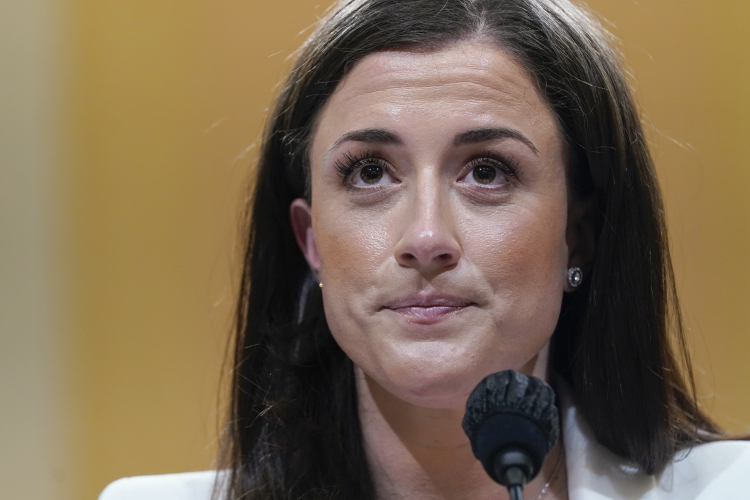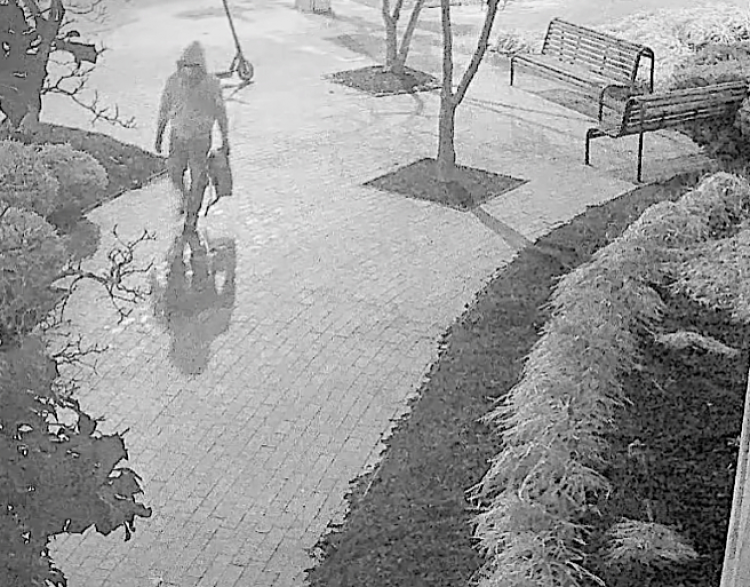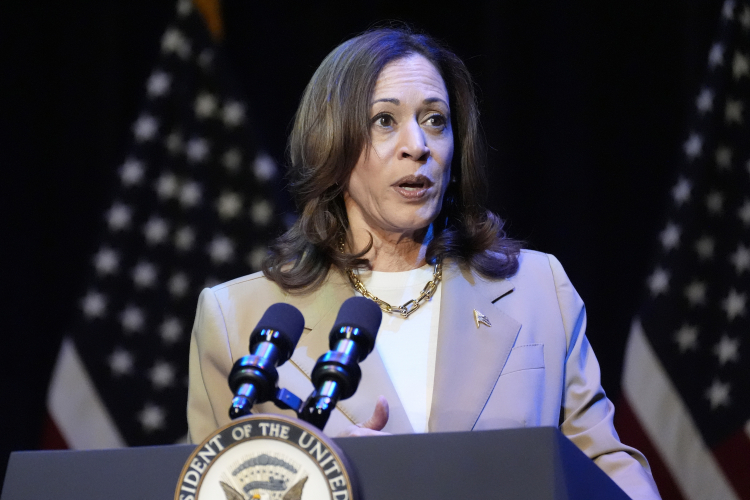

Rep. Bennie Thompson, Jan. 6 panel chairman: Called on the inquisitive Inspector General Cuffari to resign.
AP
His office subsequently opened a criminal investigation into the matter.
“The USSS erased those text messages after OIG [Office of Inspector General] requested records of electronic communications from the USSS, as part of our evaluation of events at the Capitol on January 6,” the inspector general wrote in a July 2022 letter to chairmen of both the Senate and House Homeland Security committees, including Rep. Bennie Thompson, who also chaired the Jan. 6 committee at the same time.
Cuffari further flagged the DHS’s lack of cooperation with his inquiry, something he had already pointed out in an earlier report to the committees. “DHS personnel have repeatedly told OIG inspectors that they were not permitted to provide records directly to OIG and that such records had to first undergo review by DHS attorneys,” Cuffari continued in the letter.
Not true, responded Secret Service spokesman Anthony Guglielmi. He claimed the texts had been deleted when cell phones were reset to factory settings as part of a device replacement program. “The insinuation that the Secret Service maliciously deleted text messages following a request is false.” (Guglielmi’s truthfulness was brought into question recently when he claimed it was “absolutely false” that the Secret Service rejected the Trump campaign’s multiple requests for additional security prior to the Pennsylvania rally. The Washington Post later confirmed that top Secret Service officials “repeatedly denied” requests for more manpower and equipment to protect the former president at large events.)
And despite initially insisting the texts were not lost, Guglielmi shortly thereafter said the missing Jan. 6-related messages were not recoverable. Cuffari did acquire the cell phones of two dozen Secret Service agents on duty that day, which did not have texts from that day but could have other pertinent information.
But rather than demand that the DHS use its extensive investigative tools to retrieve the texts, Thompson instead turned his fire on Cuffari. Thompson suggested Cuffari’s alleged delay in notifying the committee about the purged texts represented a cover-up and “cost investigators precious time to capture relevant evidence.” Cuffari had, in fact, notified the Homeland Security committee of both the Senate and House, of which Thompson was chairman, at least twice that DHS officials were not cooperating in his J6 probe.

Cassidy Hutchinson: Why wouldn’t the Jan. 6 committee want records to prove or disprove her claims damaging to Trump?
AP
“The Department repeatedly suggested that OIG might not have a right of access to the records sought, but during the months-long period in which access was delayed the Department did not cite any legal authority – that would have justified withholding the information,” Cuffari disclosed in a September 2021 report to Congress.
Despite Cuffari’s warnings related to stonewalling by DHS brass, Thompson accused Cuffari of withholding news of the deleted messages. In a July 2022 letter, just two weeks after Cuffari disclosed the missing texts, Thompson asked him to step aside from the J6 inquiry. Calls for Cuffari’s dismissal have also been driven by the nonprofit “watchdog” group, the Project on Government Oversight. The vice chair of POGO’s board is Debra Katz, a lawyer for Brett Kavanagh’s accuser, Christine Blasey Ford, during his tawdry Supreme Court nomination hearings.
Critics say Thompson’s demand for Cuffari’s recusal appeared to contradict his stated mission to find the truth about Jan. 6. For example, former White House aide Cassidy Hutchinson, a star witness for the committee, provided a shocking account about how Trump allegedly assaulted one of the Secret Service agents on his detail that afternoon. Wouldn’t Thompson and the other committee members want records to prove her claims, which are now in dispute by several individuals, including the driver she said Trump tried to attack? Why would Thompson want to get rid of the watchdog attempting to locate messages critical to filling an important missing piece of the Jan. 6 puzzle?
In fact, Thompson told Rep. Thomas Massie (R-Ky) in February his committee “could have had a better, more thorough report had we had access to all those records.” Thompson further said that the deletions not only violated the Federal Records Act but may have also amounted to obstruction of justice since he had issued a subpoena, the only one his committee sought from an executive office, seeking the records.
Talk but No Action
But neither his committee nor a Democrat-controlled Congress did anything about it. Unlike the committee’s criminal referral to the Department of Justice against Trump for obstructing an official proceeding, Thompson did not pursue criminal charges against any DHS official responsible for erasing the text records.
But Thompson did continue his attacks on Cuffari aided by his House colleagues and DHS IG employees, who wrote a letter accusing Cuffari of “continued mismanagement.” “IG Cuffari has made it clear that he wishes to remain in his position, even in the face of prolonged, deserved criticism in the media, from Congress, from other oversight entities and from his own staff. A true leader would recognize the effect of his actions on his workforce and understand the right thing to do would be to step aside,” anonymous staffers wrote in a September 2022 letter to Joe Biden asking him to fire Cuffari.
The Council of the Inspectors General on Integrity and Efficiency, or CIGIE, which oversees federal inspector generals, also went after Cuffari by opening a flood of inquiries into the DHS IG’s office. In response, Cuffari filed a lawsuit seeking relief from “an unjust, Kafkaesque system produced by an unconstitutionally structured entity and abetted by a complete absence of independent oversight, accountability and lawful due process.” A federal judge dismissed his effort to stop the investigation, ruling that he had not suffered any harm.
CIGIE is mired in its own scandals; in May, several Republican House members sent a letter to a top CIGIE official demanding answers about the “politicization” of the organization. During a House hearing on July 24, committee members accused CIGIE chairman Mark Greenblatt of a lack of transparency and the “subjective” nature of CIGIE’s work.
House Democrats, including Thompson, continue to seek Cuffari’s resignation more recently for deleting text messages off his government device. Cuffari told Congress he did not consider the texts applicable under the Federal Records Act.

An enduring mystery involving Kamala Harris: Suspected pipe bomber outside the DNC on the eve of Jan. 6.
FBI
Intriguingly, as Cuffari begins his probe of the attempt on Trump’s life, his Jan. 6 report may shed light on an alleged threat to Vice President Harris.
More than three-and-a-half years later, investigators still have not arrested anyone for planting pipe bombs outside the headquarters of both the Democratic National Committee and the Republican National Committee on the evening of Jan. 5. The FBI’s investigation reportedly remains open but apparently went cold.

Kamala Harris: Why did the Secret Service fail to notice an alleged pipe bomb outside the Democrat National Committee office on Jan. 6 – while the Vice President-elect was inside?
AP
For reasons still unknown, Harris left Capitol Hill around 11:15 a.m. on Jan. 6 following a briefing for the Senate Intelligence Committee. Although an official schedule indicated she planned to go home, she instead arrived at DNC headquarters along with a Secret Service detail at 11:25 a.m.
Video captured by a security camera outside the building showed a bomb-sniffing dog conducting a vehicle search at 9:44 a.m., roughly two hours before Harris’ arrival. The canine did not detect the explosive device sitting just a few feet away near an outdoor bench.
Neither did officers from Capitol Police and D.C. Metropolitan Police, who intermittently arrived at the building throughout the morning and into the early afternoon. Harris’ Secret Service detail did not appear to conduct any meaningful search of the premises before or during her visit.
And when a plainclothes Capitol Police officer discovered the pipe bomb at 1:07 p.m., no officer appeared overly concerned that a device the FBI later said was viable and deadly was within distance of the incoming vice president.
She was evacuated about 10 minutes later.
How did the Secret Service miss the device in plain view? Was anyone fired for failing to properly sweep the area and endangering the life of their protectee? Were new protocols put in place to avoid repeating such a frightening scenario in the future?
Cuffari’s report presumably will finally answer those questions because agency officials have not.
Not only are the FBI and Secret Service tight-lipped about the incident, but Harris herself has yet to discuss it publicly.
Harris has not explained why she, a sitting U.S. senator at the time, left the Capitol 90 minutes before the beginning of the joint session of Congress to certify her groundbreaking election. She appears to have been the only senator not in attendance as the proceedings commenced. Why did she plan to miss such a historic event? How did she feel when she was told of the alleged bomb?
It would be nearly impossible for the national news media to continue to ignore her ties to the pipe bomb story if Cuffari addressed it in his investigation.
“Any delay or obstruction by Mayorkas is unacceptable,” Loudermilk said, “especially now that the DHS IG is investigating the serious USSS security failures at the Trump rally in Butler PA.”
 Print
Print




